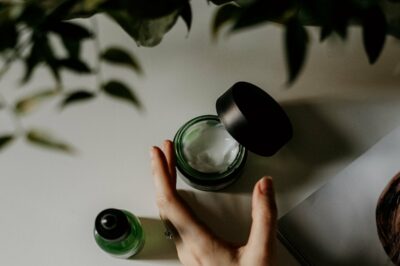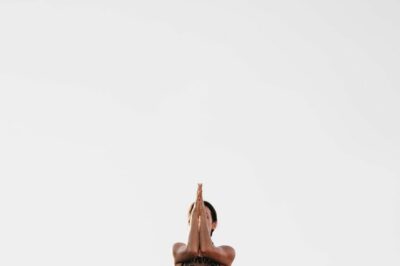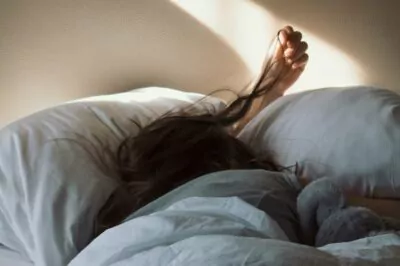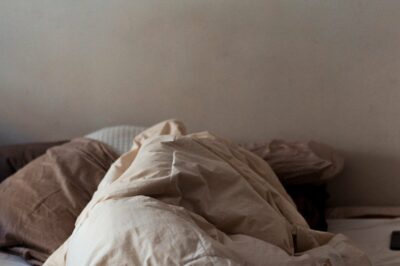Are your eyes drooping even now as you read this?
About 35 percent of us—more than a third—aren’t getting the recommended 7 hours of sleep per night.
Getting less than 7 hours of sleep per night, has been linked in studies to a number of health problems, and ultimately, shorten the length of life.
But it’s not just our lifespan we need to be concerned with. A lack of sleep can make us feel and look older than we actually are.
But we’re all so busy! How can we manage our schedules and still get enough sleep? We’ve got some ideas for you below.
Lack of Sleep Can Make You Lose Your Youthful Glow
You’ve probably had friends or loved ones comment that you “look tired” on occasion. But did you know that a regular lack of sleep can actually accelerate the appearance of aging on your skin?
We talked about this on a previous post, but here’s a quick summary. Researchers looked at the skin of 60 pre-menopausal women between the ages of 30 and 49. They examined it under UV light to see how it reacted, and also disrupted the barrier to see how long it would take to heal.
Results showed that poor quality sleepers showed increased signs of skin aging like fine lines, uneven pigmentation, and reduced skin elasticity.
Good quality sleepers, on the other hand, had skin that recovered more quickly from stressors to the skin. Their skin was better at calming inflammation after UV exposure, retaining moisture and preventing moisture loss, and repairing damage.
“Our study is the first to conclusively demonstrate that inadequate sleep is correlated with reduced skin health and accelerates skin aging,” said Dr. Baron, Director of the Skin Study Center at UH Case Medical Center.
Another study in 2015 found similar results. A total of 30 female participants were allowed to sleep for only six hours a night (rather than the recommended 7 or 8) for five nights in a row. The results were described as “shocking.”
Researchers photographed and tested the skin at the beginning of the study, and again after the five days. They found that fine lines and wrinkles increased by 45 percent! In addition, age spots increased by 13 percent, and redness by 8 percent. Participants said they felt 33 percent less attractive at the end of the study.
Want a new beauty treatment? Get your 7-8 hours of sleep per night!
Lack of Sleep Can Increase Risk of Disease
Too little or too much (over 9 hours) of sleep has also been linked to a number of other health problems.
These include high blood pressure, cardiovascular disease, diabetes, depression, obesity, cancer, and more. When we don’t get enough sleep we tend to struggle through the day, are more likely to have trouble concentrating, and to get into accidents while driving.
Why is sleep so important? Researchers still don’t understand everything that happens while we’re asleep, but they know some things.
During sleep:
- Brain health: The brain “sweeps up” a toxic byproduct known as amyloid beta—the same byproduct associated with Alzheimer’s disease—at a faster rate than it does during wake times. Without enough sleep, there my be too much of this byproduct left around to cause problems.
- Body repair: The body produces growth hormones that we need for repair and for building cells and tissues. During sleep, the body goes into repair mode in general, healing the heart, blood vessels, and more.
- Weight: The body balances hunger and satiety hormones. When we don’t get enough sleep, these hormones get out of whack, and we feel hungrier, often for unhealthy, sweet foods. Poor sleep is strongly linked to weight gain.
- Focus: Studies show that poor sleep affects concentration and productivity. People tend to make more mistakes and don’t learn as well.
- Blood sugar: During sleep, the body is able to balance out blood sugar levels. In one study, participants who received only 4 hours of sleep per night for 6 nights in a row developed symptoms similar to those associated with pre-diabetes.
- Mental health: The brain helps cement new memories, forms new pathways related to learning and memory, and prepares your mind for the next day. A lack of sleep is associated with poor learning, reduced attention, increased problems making decisions, mood swings, and depression.
- Immune system: The body restores the immune system to help fight against disease.
This is just a brief overview, and we still don’t know it all. The bottom line is that a good night’s sleep is critical to overall health, well being, and appearance.
10 Tips to Help You Get More Sleep
If you’re having trouble sleeping and it’s lasted awhile (a few weeks or more), talk to your doctor. It’s always best to be sure there isn’t some health condition underlying the issue.
Then, try these tips to increase your odds of enjoying a long, peaceful slumber:
- Time: Get up and go to the bed at the same time every day, even on weekends. This helps set your body’s circadian rhythms, and once you’re used to the habit, it will be easier to fall asleep at the right time.
- Invest in a good mattress: If you get eight hours of sleep per night, and you live about 75 years, you’ll sleep for about 25 years of them. You spend a lot of hours in your bed. It’s critical that you invest in a quality mattress that supports you well and allows you to sink into a deep sleep. If you wake up sore, or you have many restless nights, consider the possibility that your bed could be to blame.
- Make your room sleep-friendly: Your bedroom needs to be set up for sleeping—not working or watching television or other activities that will keep you awake. Remove all technological gadgets (including your cell phone) from your room. Consider blackout curtains to make the room dark (light signals your brain to be awake), and consider earplugs or white noise machines if you have to sleep in a noisy environment.
- Read a paper book before bed: If you like to read before bed—which is a great way to relax your mind—use either a paper book or a non-backlit tablet, like the basic Kindle. Most tablets are backlit, which exposes your brain to blue light. Blue light messes with your melatonin—the sleep hormone. Using tablets and other gadgets before sleep tells your brain that it’s time to be awake and increase risk of insomnia. Even if you do sleep, it will not be as deeply.
- Exercise: Exercising during the day wears out your body and relaxes your mind. It is one of the best things you can do to improve your sleep. Aim for 30 minutes of moderate to vigorous physical activity every day, but don’t wait too long. If you exercise too close to your bedtime, your body will still be revved up and will have a hard time falling asleep.
- Avoid caffeine and alcohol: Caffeine is stimulating and can keep you awake, so try to stop all caffeine consumption earlier in the day. The more sensitive you are to it, the earlier you should stop consuming it. Alcohol, as well, may help you feel drowsy initially, but has been shown in studies to disrupt sleep later on during the night, which affects that important REM “deep” sleep that is so necessary to body and mind repair.
- Practice stress-relieving activities: Deep breathing, meditation, yoga, tai chi, art therapy, and/or time with pets—all these are relaxing, stress-relieving activities. It’s important to work these into your daily schedule, as we all have stress and need some way to deal with it so it doesn’t negatively affect us health wise. Doing some of these before going to sleep can also be really helpful. Try a warm bath with some essential oils, aromatherapy, journaling, listening to music, a quiet yoga routine, or other relaxing activity about an hour before bed.
- Review your daily schedule: If you’re getting to the end of the day and finding it difficult to meet your scheduled sleep time, take a step back and see what you can change. It could be that you have just too much on your “to-do” list and you need to sacrifice something. Remember—this is your health we’re talking about. Maybe you can delegate something at work, cooperate with other parents to share childcare or carpooling, or cut out one activity from your weekly calendar.
- Watch out for late-night munchies: Studies have shown that our brains are wired to munch late at night, but overeating before bed can disturb sleep. Try low-cal alternatives like a cup of hot tea, small serving of yogurt, a hard-boiled egg, a piece of healthy dark chocolate, a small piece of fruit, small bowl of whole-grain cereal, or something similar. Even better—try to break yourself of the habit by doing something else instead. Something with your hands is the best: play an instrument, knit or crochet, draw, color, work on a puzzle, or something that will keep you busy and not thinking about food.
- Create a bedtime ritual: Try to set up a regular before-bed routine. It may include shutting off the television and cell phone, turning down the lights, doing some light stretching, taking a bath, listening to some relaxing music, reading (not on a backlit device), journaling, etc. Maybe you spend an hour doing something relaxing, a few minutes cleaning up, and fifteen minutes reading or journaling before you finally shut your eyes. Make your routine work for you and then stick with it.
Do you get 7-8 hours of sleep per night? Let us know in the comments below!
Sources
NCBI – Sleep Duration and All-Cause Mortality: A Systematic Review and Meta-Analysis of Prospective Studies
Science Daily – Short sleep increases risk of death and over-long sleep can indicate serious illness
Pub Med – Mortality associate with sleep duration and insomnia.
Science Reports – Nighttime sleep duration, 24-hour sleep duration and risk of all-cause mortality among adults: a meta-analysis of prospective cohort studies
Pub Med – Does poor sleep quality affect skin ageing?
MSN Health & Fitness – Is sleep deprivation ruining your skin?
The Sleep School – Does sleep deprivation have any impact on our appearance?
Authority Nutrition – 10 Reasons Why Good Sleep is Important








No doubt, these tips have helped me a lot.
But if anyone wants to know, other than these, I tried listening to relaxing music, and it worked wonders for me.
So I think others might also give it a try.
I have a lot of healthy habits, but sleep is something I am still working on. Definitely avoiding blue light at night helps. I find wearing a sleep mask is really helpful too!
I’m lucky if I get 5 hours!
Work pull time,part time college whilst trying to fit time in for assignments.
I’ve run into two issues…
I always shoot for at least 7 hours, but I rarely attain it. I’m a single mom struggling to form healthy boundaries with my kids (3 amazing kids) so that my downtime/me-time doesn’t cut into my need for sleep. Most of the time my downtime is cut short because we’re still reading past bedtime or played a game too long. It’s not usually something I don’t enjoy doing with them. However I’m a student as well, so there are papers to write and stuff to study before sleeping. Gotta figure that one out!
My other issue stems from the schedule disruption I feel when my kids are at their dad’s house. Many times I find myself wandering until 3-4am because I haven’t shut my house down yet (brushed their teeth, read, etc.). It’s absolutely bazaar! I feel like I can’t just put myself to bed and I end up falling asleep wherever I was last able to keep my eyes open (usually the couch or my desk).
So those are mine sleep barriers. I’m curious about the experience of others reading this blog. I know I’m not the first one to deal with this and would love to hear the thoughts of others!
12:29 am… Sleep well! ; )
Being a single mom AND going to school is quite challenging. When your kids are gone, it changes your routine so you don’t feel ready to go to bed. I suggest finding the same activity to do before bed on the nights they’re gone, & try to keep the same bedtime even though you may feel like you need to get more done when they’re gone. You’ll get more done the next day if you’ve had enough sleep anyway. Maybe get in bed & do some of the boring college reading; that’ll put you to sleep!
My holistic dietician gave me a magnesium supplement to take before bed, which has been very helpful
My neighbors smoke cigarettes and assorted substances 24/7, but mostly as soon as it gets dark, and continuing way past midnight. Both my bedrooms are stifling hot, smelly, (smoke drifting through floors), opening windows is not an option, and sleep has become an all-night battle.I’ve been losing weight (I’m not ]overweight) and “life” is an expensive 24/7 “challenge”.
Gratefully taking your advice, I’m trying a variety of essential oils to help me relax and neutralize some stress.